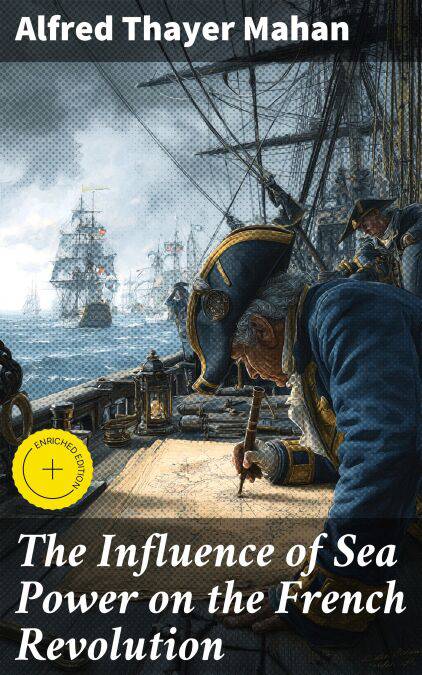
- Afhalen na 1 uur in een winkel met voorraad
- Gratis thuislevering in België vanaf € 30
- Ruim aanbod met 7 miljoen producten
- Afhalen na 1 uur in een winkel met voorraad
- Gratis thuislevering in België vanaf € 30
- Ruim aanbod met 7 miljoen producten
Zoeken
The Influence of Sea Power on the French Revolution E-BOOK
Enriched edition. 1793-1812
Alfred Thayer Mahan
E-book | Engels
€ 0,49
Uitvoering
Omschrijving
In "The Influence of Sea Power on the French Revolution," Alfred Thayer Mahan examines the pivotal role of maritime dominance in shaping the political and military landscapes of the Revolutionary period in France. Mahan's work is characterized by his analytical rigor and masterful narrative style, intertwining strategic military analysis with historical events to illustrate how control of the seas influenced revolutionary outcomes. He carefully delineates the relationship between naval supremacy and national strength, grounding his exploration in a rich selection of historical anecdotes and empirical data, thereby situating his observations within a broader geopolitical context. Alfred Thayer Mahan was a prominent naval officer and historian whose experiences in the United States Navy profoundly informed his scholarly pursuits. His earlier works established his reputation as a leading theorist of sea power, and his acute awareness of maritime strategy and international relations led him to ponder how these elements shaped the turbulent era of the French Revolution. Mahan's academic background in military strategy, combined with his fascination for history, endowed him with the unique perspective needed to analyze the revolutionary dynamics of his time. This book is an essential read for scholars, historians, and military strategists alike. Mahan's penetrating insights into the interplay between naval power and revolution not only enrich our understanding of the French Revolution but also resonate with contemporary discussions about the strategic significance of sea power in global affairs. For anyone interested in the complexities of military history and its impact on socio-political shifts, Mahan's work remains a vital and compelling exploration.
In this enriched edition, we have carefully created added value for your reading experience:
- A succinct Introduction situates the work's timeless appeal and themes.
- The Synopsis outlines the central plot, highlighting key developments without spoiling critical twists.
- A detailed Historical Context immerses you in the era's events and influences that shaped the writing.
- An Author Biography reveals milestones in the author's life, illuminating the personal insights behind the text.
- A thorough Analysis dissects symbols, motifs, and character arcs to unearth underlying meanings.
- Reflection questions prompt you to engage personally with the work's messages, connecting them to modern life.
- Hand‐picked Memorable Quotes shine a spotlight on moments of literary brilliance.
- Interactive footnotes clarify unusual references, historical allusions, and archaic phrases for an effortless, more informed read.
In this enriched edition, we have carefully created added value for your reading experience:
- A succinct Introduction situates the work's timeless appeal and themes.
- The Synopsis outlines the central plot, highlighting key developments without spoiling critical twists.
- A detailed Historical Context immerses you in the era's events and influences that shaped the writing.
- An Author Biography reveals milestones in the author's life, illuminating the personal insights behind the text.
- A thorough Analysis dissects symbols, motifs, and character arcs to unearth underlying meanings.
- Reflection questions prompt you to engage personally with the work's messages, connecting them to modern life.
- Hand‐picked Memorable Quotes shine a spotlight on moments of literary brilliance.
- Interactive footnotes clarify unusual references, historical allusions, and archaic phrases for an effortless, more informed read.
Specificaties
Betrokkenen
- Auteur(s):
- Uitgeverij:
Inhoud
- Aantal bladzijden:
- 682
- Taal:
- Engels
Eigenschappen
- Productcode (EAN):
- 8596547777144
- Verschijningsdatum:
- 12/12/2023
- Uitvoering:
- E-book
- Beveiligd met:
- Digital watermarking
- Formaat:
- ePub

Alleen bij Standaard Boekhandel
Beoordelingen
We publiceren alleen reviews die voldoen aan de voorwaarden voor reviews. Bekijk onze voorwaarden voor reviews.







